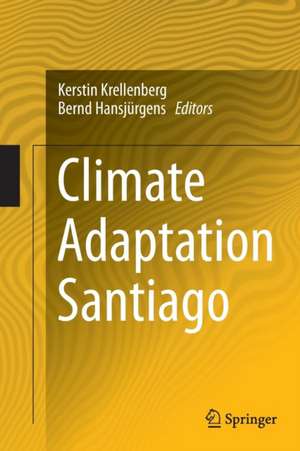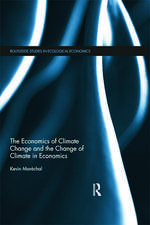Climate Adaptation Santiago
Editat de Kerstin Krellenberg, Bernd Hansjürgensen Limba Engleză Paperback – 3 sep 2016
| Toate formatele și edițiile | Preț | Express |
|---|---|---|
| Paperback (1) | 637.28 lei 6-8 săpt. | |
| Springer Berlin, Heidelberg – 3 sep 2016 | 637.28 lei 6-8 săpt. | |
| Hardback (1) | 642.51 lei 6-8 săpt. | |
| Springer Berlin, Heidelberg – 11 apr 2014 | 642.51 lei 6-8 săpt. |
Preț: 637.28 lei
Preț vechi: 749.73 lei
-15% Nou
Puncte Express: 956
Preț estimativ în valută:
121.96€ • 126.86$ • 100.68£
121.96€ • 126.86$ • 100.68£
Carte tipărită la comandă
Livrare economică 15-29 aprilie
Preluare comenzi: 021 569.72.76
Specificații
ISBN-13: 9783662510179
ISBN-10: 3662510170
Pagini: 232
Ilustrații: XVI, 216 p. 27 illus., 3 illus. in color.
Dimensiuni: 155 x 235 x 12 mm
Greutate: 0.33 kg
Ediția:Softcover reprint of the original 1st ed. 2014
Editura: Springer Berlin, Heidelberg
Colecția Springer
Locul publicării:Berlin, Heidelberg, Germany
ISBN-10: 3662510170
Pagini: 232
Ilustrații: XVI, 216 p. 27 illus., 3 illus. in color.
Dimensiuni: 155 x 235 x 12 mm
Greutate: 0.33 kg
Ediția:Softcover reprint of the original 1st ed. 2014
Editura: Springer Berlin, Heidelberg
Colecția Springer
Locul publicării:Berlin, Heidelberg, Germany
Cuprins
Preface.- Part I: Challenges for Urban Climate Change Adaptation.- Part II: Climate Change Impacts on the Urban-Regional level of Santiago de Chile.- Part III: Climate Change Impacts on Urban-Regional Level of Santiago de Chile: Key Sectors and Vulnerabilities.- Part IV: Adaptation Strategy: Developing Measures and Implementation.
Notă biografică
Kerstin Krellenberg is senior researcher and project coordinator at the Department of Urban and Environmental Sociology at the Helmholtz Centre for Environmental Research – UFZ in Leipzig (Germany). She received a PhD in Physical Geography in 2007 at the Humboldt-University of Berlin (Germany). Her research interests cover urban climate change adaptation, participatory processes, risks and vulnerabilities, with a special focus on (mega) cities.
Bernd Hansjürgens is Professor of Economics, especially Environmental Economics, at Martin Luther University Halle-Wittenberg (Germany) and head of the Department of Economics at the Helmholtz Centre for Environmental Research – UFZ in Leipzig (Germany). He received his PhD in economics in 1991 and his Habilitation in 1998 at the University of Marburg. From 1995 to 1996 he was research fellow at the Centre for Study of Public Choice in Fairfax/VA (U.S.) and from 1998 to 1999 at the Centre for interdisciplinary research at the University of Bielefeld (Germany). His research interests cover environmental economics and public finance, with a special focus in instrument choice in environmental policy. He has published more than 20 books and 150 papers.
Bernd Hansjürgens is Professor of Economics, especially Environmental Economics, at Martin Luther University Halle-Wittenberg (Germany) and head of the Department of Economics at the Helmholtz Centre for Environmental Research – UFZ in Leipzig (Germany). He received his PhD in economics in 1991 and his Habilitation in 1998 at the University of Marburg. From 1995 to 1996 he was research fellow at the Centre for Study of Public Choice in Fairfax/VA (U.S.) and from 1998 to 1999 at the Centre for interdisciplinary research at the University of Bielefeld (Germany). His research interests cover environmental economics and public finance, with a special focus in instrument choice in environmental policy. He has published more than 20 books and 150 papers.
Textul de pe ultima copertă
Th is book addresses the complexity of urbanization, impacts of climate change andclimate change adaptation for the Metropolitan Region of Santiago de Chile, with aspecial focus on the most pressing issues of natural hazards, water and energy supply. The book exemplifi es an integrative, inter- and transdisciplinary approach (IIT) for thedevelopment of adaptation measures, their evaluation and implementation in a decisionsupport framework at the science-policy interface. It builds on scientific analyses of both social and natural scientists, a participatory process with local stakeholders, and a Regional Learning Network between large agglomerations in Latin America. All this led to the development of a Regional Climate Change Adaptation Plan for Santiago de Chile. Th e book is written for scholars of urban management, climate change, planning, governance and hazard research, as well as practitioners in local, regional and international organizations concerned with climate change, climate change impacts, and adaptation in metropolitan regions. While the regional focus is on Latin America the concepts and lessons learned are applicable and relevant to megacities around the world.
Caracteristici
Offers integrative conceptual approach for addressing the whole chain of climate changes, expected impacts and vulnerabilities Presents results from a learning process with scientists and decision-makers from six large agglomerations in the Latin American region Specific focus on Latin America Includes supplementary material: sn.pub/extras















